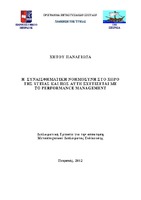Η συναισθηματική νοημοσύνη στο χώρο της υγείας και πώς αυτή σχετίζεται με το performance management.
Emotional intelligence in health care and how it is related to performance management.

Προβολή/
Θεματική επικεφαλίδα
Συναισθηματική νοημοσύνη ; Medical personnel ; Ιατροί ; ΝοσηλευτέςΠερίληψη
Τα τελευταία χρόνια, τόσο ο επιχειρηματικός κόσμος όσο και η ιατρική κοινότητα έδειξαν να συνειδητοποιούν ότι το συναίσθημα μπορεί να αποτελέσει ένα σημαντικό παράγοντα που μπορεί να επηρεάσει την απόδοση και την επαγγελματική ικανοποίηση. Εδώ και περίπου μια δεκαετία η επαγγελματική επιτυχία έχει συνδεθεί με την εμφάνιση συγκεκριμένων χαρακτηριστικών τα οποία περιγράφηκαν από τους ερευνητές ως Συναισθηματική Νοημοσύνη ( EQ ). Τα πέντε συστατικά της συναισθηματικής νοημοσύνης στο χώρο της εργασίας είναι η αυτεπίγνωση, η αυτοδιαχείριση, η αυτό-παρακίνηση, η κοινωνική επίγνωση και η κοινωνική επιρροή. Η συναισθηματική νοημοσύνη μπορεί να μετρηθεί με κατάλληλα τεστ και μπορεί να αναπτυχθεί με την κατάλληλη εκπαίδευση. Έχει ήδη συζητηθεί στην βιβλιογραφία της ιατρικής εκπαίδευσης ότι η συναισθηματική νοημοσύνη μπορεί να χρησιμοποιηθεί για την αξιολόγηση και τον καθορισμό των επιπέδων επαγγελματικής επάρκειας στα πλαίσια του ενδιαφέροντος/ηθικής διάστασης και της μέτρησης για επιλογή στην εκπαίδευση της ιατρικής σχολής ιδίως όσον αφορά τα διαπροσωπικά και επικοινωνιακά προσόντα. Οι γιατροί θεωρούνται το πρόσωπο κλειδί στο χειρισμό της σχέσης γιατρού-ασθενή, επηρεάζοντας τον τρόπο που οι ασθενείς αντιλαμβάνονται και νιώθουν για τη θεραπεία και τη νόσο τους. Σαν αποτέλεσμα αυτού, τα διαπροσωπικά και επικοινωνιακά προσόντα έχουν σχεδιαστεί να αποτελούν σαν μια από τις έξι περιοχές επαγγελματικής επάρκειας των γιατρών από το συμβούλιο διαπίστευσης για την ιατρική εκπαίδευση (Accreditation Council for Graduate Medical Education). Ο ευρύτερος χώρος της υγείας είναι σύνθετος. Αποτελείται αφενός από τα νοσηλευτικά ιδρύματα και γενικότερα τις εταιρείες παροχής υπηρεσιών υγείας όπου ιδιαίτερη έμφαση δίνεται στην απόδοση του ιατρικού και νοσηλευτικού προσωπικού (και την αποκόμιση κέρδους όταν πρόκειται για ιδιωτικό φορέα) και αφετέρου στις επιχειρήσεις που παράγουν φάρμακα, αναλώσιμα υλικά και ιατρο-τεχνολογικό εξοπλισμό. Στις επιχειρήσεις αυτές βασικός στόχος είναι η παραγωγή ασφαλών και αποτελεσματικών προϊόντων τα οποία βεβαίως αποφέρουν κέρδη και εξασφαλίζουν την βιωσιμότητα της επιχείρησης. Τελικός αποδέκτης των υπηρεσιών υγείας είναι ο ασθενής: άμεσος αποδέκτης όταν πρόκειται για παροχές υπηρεσιών υγείας, έμμεσος όταν πρόκειται για κατανάλωση φαρμάκων και αναλώσιμων υλικών. Σκοπός αυτής της εργασίας είναι να εξετάσει το ρόλο της συναισθηματικής νοημοσύνης στο χώρο της υγείας και πως αυτή συνδέεται με την Διοίκηση Απόδοσης. Η συσχέτιση συναισθηματικής νοημοσύνης με την νοσηλευτική εργασία έχει γίνει εδώ και χρόνια όπως βεβαιώνεται από τις αντίστοιχες δημοσιεύσεις και κανείς δεν αμφιβάλει ότι η συναισθηματική επάρκεια και στις τέσσερις ομάδες χαρακτηριστικών της ΣΝ αποτελεί απαραίτητο προσόν για την άσκηση του νοσηλευτικού επαγγέλματος αφενός και αφετέρου συνδέεται θετικά με αυξημένη απόδοση και αποτελεσματική ηγεσία. Αυτό που μένει είναι οι ανάγκες που έχουν επισημανθεί θεωρητικά να καλυφθούν και στην πράξη. Επομένως το επόμενο βήμα που θα περίμενε κανείς είναι να ξεκινήσουν προγράμματα εκπαίδευσης των νοσηλευτών που θα αφορούν την εκμάθηση και την ανάπτυξη της ΣΝ τόσο στο επίπεδο των σπουδαστών όσο και των ήδη εργαζόμενων νοσηλευτών. Οι αναφορές από τη διεθνή βιβλιογραφία επισημαίνουν σαφώς ότι η ανάπτυξη της συναισθηματικής νοημοσύνης βοηθά τους γιατρούς να ανταπεξέρθουν καλύτερα στα προβλήματα που αντιμετωπίζουν στον επαγγελματικό χώρο (καλύτερη διαχείριση του στρες και συνεργασία με άλλους επαγγελματίες υγείας , αποφυγή εξάντλησης, μεγαλύτερη εργασιακή ικανοποίηση και τελικά καλύτερη ποιότητα φροντίδας των ασθενών ). Επίσης οδηγεί στην βελτίωση της απόδοσης τους όπως αυτή ορίζεται από την αύξηση της ικανοποίησης των ασθενών και τη δημιουργία σχέσης εμπιστοσύνης μεταξύ γιατρού και ασθενή. Η ΣΝ προέκυψε ότι αποτελεί βασικό χαρακτηριστικό γνώρισμα για επιτυχημένη ηγεσία όταν πρόκειται για γιατρούς επικεφαλείς τμημάτων και γενικά γιατρούς με διοικητικά καθήκοντα. Το μόνο που μένει είναι όσα έχουν τεκμηριωθεί θεωρητικά μέσα από σχετικές μελέτες να γίνουν πράξη και έτσι η εκπαίδευση στην ΣΝ και στην ηγεσία κατ’ επέκταση , να αποτελέσει τμήμα της υποχρεωτικής εκπαίδευσης των ιατρικών σχολών. Οι σύγχρονοι οργανισμοί υγείας πρέπει να λειτουργούν με προσανατολισμό την ΣΝ προκειμένου να ανταπεξέρθουν σε ένα πολύ ανταγωνιστικό και εχθρικό περιβάλλον, όπως διαμορφώνεται ο χώρος της υγείας σήμερα. Μόνο με την συναισθηματική νοημοσύνη είναι δυνατόν να παρουσιάζει ένας οργανισμός υγείας υψηλή απόδοση, όπως αυτή εκφράζεται από την καλύτερη ποιότητα της φροντίδας των ασθενών, την αποφυγή ιατρικών λαθών και την ικανοποίηση των ασθενών. Σε ότι αφορά τη χώρα μας, η αντίστοιχη βιβλιογραφία είναι ελάχιστη. Γεγονός όμως είναι ότι όσο εντείνεται η οικονομική κρίση και οι χρηματικοί πόροι μειώνονται ενώ οι ανάγκες συνεχώς αυξάνονται, είναι απαραίτητη η αύξηση των συναισθηματικών επαρκειών και της απόδοσης των επαγγελματιών για να αντεπεξέρθουν στις συνθήκες που γίνονται όλο και πιο δύσκολες. Συνεπώς και στον ελληνικό χώρο ,όπως αντίστοιχα και στον διεθνή, η εφαρμογή τη εκπαίδευσης στη ΣΝ σε προπτυχιακό ή μεταπτυχιακό επίπεδο, είναι κάτι το οποίο θα πρόσφερε πολύ στην αύξηση των ικανοτήτων και της απόδοσης των επαγγελματιών υγείας.


